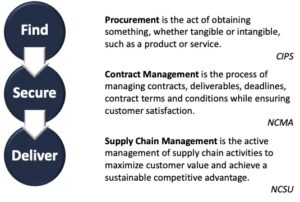Human Resource Planning for Procurement, Contract Management and Supply Chain Management

I spoke recently on the subject of Strategic Human Capital, and the importance of developing human resource planning for supply chains with Dan Finkenstadt at the NCMA World Congress. Much of the material was developed by Dr. Ian George, who has done significant work in assessing procurement skills and capabilities. As shown in the figure below, there are diverse and sometimes competing goals between procurement, contract management and supply chain management. The challenges posed by these differences is NOT so much about system integration, but rather the pain points that exist due to the “disconnect” between the goals of procurement, contract management and demand-facing supply chains. (Courtesy of Ian George, PhD). The first element to consider is the diverse objectives that typically accompany each of these activities.

Procurement: The focus is primarily on “buying” which often means that the priority is on physical acquisition, often at the lowest price in the market. Procurement is notorious for focusing almost exclusively on cost or price, and in taking possession of a good. This often ignores the requirements of customers and delivery mechanisms.
Contract Management: The focus is primarily on reducing risk in the future transactions in a post-award mechanism. This often entails complex negotiations involving legal requirements, deadlines, terms and conditions, and other elements that have little to do with the actual flows of material in the supply chain. Contract managers are notorious for focusing almost exclusively on their terms and conditions, especially on limits of liability and other terms.
Supply Chain Management: Demand-facing supply chain managers’ focus is almost always on the physical delivery terms and fulfillment of customers. This is often at the expense of other key variables such as cost, working capital or inventory costs, and total cost of ownership factors. The focus is on customer-value, but this is often done at almost any cost.
As is evident from these definitions, there is a clear mis-alignment between these functional activities, and organizations are struggling to put together a cohesive strategic plan that bridges these three interrelated activities. IThis divergence is a struggle that is faced by organizations working towards these objectives, and identify the primary levels of mis-alignment that exist among them.
With the movement towards digital transformation, many procurement and supply chain executives are pushing for more technical skills, given the increased focus on IoT and more advanced Operations Research applications for SCM, including non-linear optimization, simulation, and stochastic agent-based modeling. However, we are also positing that we cannot forget the need for strategic foresight, planning and what the futurist Peter Singer calls “Useful Fiction”[1]. Useful Fiction, or “Intelligence Fiction”, is a deliberate fusion of narrative’s power with real-world research’s utility. We are moving to a world of machine-speed convergence of possibility that often leaves conventional forecasting or analysis out of step. So, FICINT melds communication and envisioning techniques honed by creative communities of writers or graphic novelists with the process and rigor of intelligence collection and analysis. In some circumstances, it can be an act of prediction, in others explanation.
As organizations struggle to deal with an unpredictable ecosystem, we need behavioral skills that are advanced, which include the ability to create intelligence networks to be able to both “grease” the flow of supplies and services, as well as increase our ability to detect potential risks to that flow via human sensors and intelligence gathering.
It is sometimes difficult to convince recruiters that behavioral skills are important. Today it seems that everyone is on the tech skill bandwagon, who can work directly with improved emerging technologies like blockchain, control towers, more advanced warning algorithms etc. What we need is a more nuanced position, that addresses the fact that behavioral skills are lacking but tend to yield greater benefits. In particular, we need experienced procurement, contract management, and supply chain managers who have the critical behavioral skills needed to deal with the “nuanced” decisions that we alluded to earlier.
The importance of behavioral skills was supported by a Harvard Study (conducted in 2020 and released by The National Bureau of Economic Research)[2] that looked at what the differentiating factors were now that ‘most’ large organizations were digitally capable. The findings were that people had become the differentiating factor – hence the importance of behavioral/relational skills. In short, Emotional Intelligence was more important than IQ, once the other types of digital tools were in place.
We also need to give some thought as to the different roles that procurement and supply chain managers play on teams. In general, we find that they can be in the following categories:
Jacks of all Trades tend to be able to adapt quickly to situations in a supporting role. These people perform best with medium-level activities. The pool of available people is typically high and varied. Digitalization is aggressively trying to automate these roles. Jack of all Trades get the critical mass of work done .. . . but sometimes miss the critical details. They are often best at managing low complexity tasks.
On the other end of the spectrum, Experts tend to own a single, focused area and manage the environment surrounding it. It takes a long time to develop someone as a high-performing expert. The pool of available people is typically very small. To develop someone from scratch takes many years. Experts can deal with much more complex tasks, and are usually able to take decisive action quickly.
Teams tend to own multiple products and/or services and manage the environment surrounding them. Specialists lead when needed and support the team at other times. Teams are fluid and able to accommodate people moving in and out. A product/service focus makes teams more tuned to customer needs. Teams have the expertise to ask the right question . . .
. . . and find the right people with the best answers. But they may take much longer to make decisions.
Thinking through the different roles and level of specialization will be critical if procurement and supply chain executives are to make progress on the human capital front to drive their strategic planning. Recruiting needs to be more than an afterthought, but needs to be front and center as part of the strategic plan to transform procurement, contracting, and supply chains.
[1] https://www.queensu.ca/psychology/sites/webpublish.queensu.ca.psycwww/files/files/Journal%20of%20Future%20Conflict/Issue%202%20Fall%202020/Issue_2-Singer.pdf
[2] https://www.nber.org/system/files/working_papers/w28733/w28733.pdf


